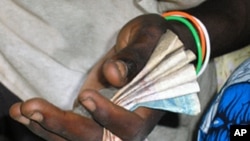As the political impasse persists in divided Ivory Coast, the West African country, which was once the region’s economic powerhouse, faces further decline. Residents and analysts are very worried about the quickly dissolving economic situation there.
At a protest this week in Abidjan, a farmer complained about an ongoing cocoa embargo by major foreign export companies.
The farmer said, in Ivory Coast, cocoa money is essential for keeping children in school and for staying alive.
As economic sanctions pile against the government of disputed incumbent President Laurent Gbagbo, more and more banks operating in Ivory Coast shut down this week, prompting a run on the few remaining banks which have stayed open.
One student trying to get his money out, Jules Camara, said everyone is getting irritated.
He said banks should stay out of politics.
Shortages in cooking gas, rising prices in food markets, mass layoffs and companies shutting down are some of the other economic distress factors which are becoming more and more common place throughout Ivory Coast.
There is now general uncertainty whether Mr. Gbagbo will be able to pay the army and civil servants for the month of February.
In a statement read on state television late Thursday, Mr. Gbabo’s government said it would take over control of some of the closed banks, but it was unclear if it would be able to do so.
The United Nations, African groupings and most countries recognize Mr. Gbagbo’s challenger Alassane Ouattara as the winner of last year’s presidential election. But in December, the Ivory Coast constitutional council threw out votes from the rebel held north, alleging fraud. This gave victory to Mr. Gbagbo and produced the current stalemate.
After independence from France in 1960, the Ivory Coast economic success story was built on cocoa, and other agricultural products including coffee, cotton and fruits.
But many laborers, who originally came from neighboring countries, and their descendants, increasingly felt marginalized. This contributed to a rebellion in 2002 which split Ivory Coast in two.
Africa analyst with British-based Chatham House Paul Melly says while other West African countries have had economic growth in recent years, Ivory Coast has faced a steady decline.
"Cote d’Ivoire, the great success story has spent a decade stagnating, caught between civil war and this sort of peace that barely functions with interminable political wrangling and consequently an almost total absence of long term government strategy," said Melly.
He says the north under rebel occupation was the first area to face a severe downturn.
"For most of the last decade, public services have been completely absent because the government in the south stopped paying people. So, [you have] just basic grassroots non-governmental organization assistance, a few people hanging on, but mostly the public service infrastructure has decayed very badly," he said. "Health, education, and grassroots development in the poorest parts of the country have not happened for a decade."
Economists fear the northern situation could now become duplicated in the south, with an economy that increasingly subsides outside legal frameworks. They say cocoa farmers have already started selling their beans on illicit markets so their goods can be smuggled to neighboring countries.
Mr. Gbagbo, a former history professor, says he is fighting for a second independence to fully assume sovereignty from external actors, including economic ones. His opponents say he is sacrificing the livelihood of all Ivorians by refusing to cede power.
Ivory Coast Economy Quickly Deteriorates, Alarming Economists and Residents
